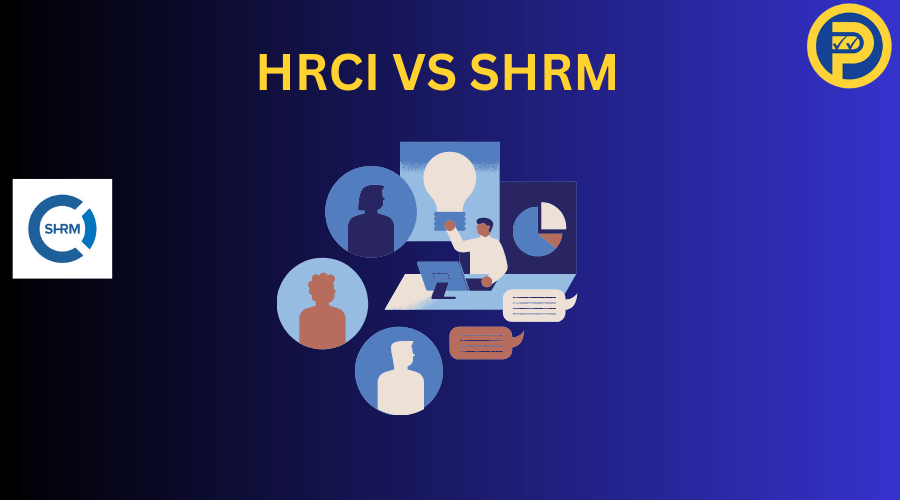Both HRCI and SHRM offer valuable certifications that cater to different needs within the human resources profession. The choice between them should be based on individual career goals, preferred learning styles, specific areas of interest within HR, as well as considerations regarding cost and exam format.
Ultimately, pursuing either an HRCI or SHRM certification can significantly enhance your professional standing and career trajectory in the dynamic field of human resources.
Read on: HR Exam
SHRM Certifications
The Society for Human Resource Management (SHRM) offers a variety of certifications that cater to different levels of experience and areas of specialization within human resources. SHRM certifications are recognized globally and emphasize both knowledge and behavioral competencies.
SHRM Certified Professional (SHRM-CP)
The SHRM-CP is designed for early- to mid-career professionals engaged in operational roles. This certification assesses knowledge of HR practices as well as the ability to apply that knowledge effectively in real-world situations.
Candidates typically have a degree in human resources or related fields and 1-3 years of experience.
The SHRM-CP exam includes questions on various topics such as recruitment strategies, performance management systems, and employee engagement techniques.
By earning this certification, individuals can demonstrate their readiness to contribute effectively to their organizations’ human resource functions.
Lean more: SHRM-CP Certification Cost
SHRM Senior Certified Professional (SHRM-SCP)
The SHRM-SCP is aimed at senior HR professionals responsible for developing strategies and leading initiatives within their organizations.
This certification focuses on advanced competencies required for strategic leadership roles and requires candidates to have 3-7 years of strategic-level experience.
The SHRM-SCP exam tests candidates on topics like organizational culture development, change management strategies, and effective communication techniques with stakeholders at all levels.
This certification equips professionals with the skills needed to influence organizational success through effective human resource management.
Related post: SHRM-SCP Requirements

HRCI Certifications
The HR Certification Institute (HRCI) has been a leading provider of HR certifications for over 40 years, offering a suite of credentials that cater to various levels of experience and specialization within the human resources field.
These certifications are designed to validate the knowledge and skills of HR professionals, enhancing their career prospects and credibility in the industry:
Associate Professional in Human Resources (aPHR)
The aPHR is an entry-level certification aimed at individuals starting their HR careers or those transitioning from other fields. It covers foundational HR concepts and practices, making it ideal for new HR professionals and non-HR managers who handle HR responsibilities.
This certification does not require prior HR experience, allowing individuals to demonstrate their knowledge of basic HR principles.
The aPHR exam consists of 125 multiple-choice questions, covering topics such as talent acquisition, employee engagement, and compliance with labor laws. This certification serves as a stepping stone for further professional development in the HR field.
Professional in Human Resources (PHR)
The PHR certification is designed for HR professionals with operational experience. It focuses on technical and operational aspects of HR management, including U.S. laws and regulations.
Candidates typically have 1-4 years of experience in the field, making this certification suitable for those involved in implementing HR programs and policies.
The PHR exam evaluates knowledge in areas such as workforce planning, employee relations, and compensation strategies. By obtaining this certification, professionals can enhance their understanding of key HR functions and improve their effectiveness in day-to-day operations.
Senior Professional in Human Resources (SPHR)
Targeted at senior HR leaders, the SPHR certification emphasizes strategic planning and policy-making responsibilities.
This credential is for those accountable for developing and executing HR strategies that align with organizational goals. Candidates usually have 4-7 years of experience in HR, demonstrating a higher level of expertise compared to the PHR.
The SPHR exam tests candidates on advanced topics such as organizational development, risk management, and strategic planning. Earning this certification can position professionals for leadership roles within their organizations.
Check out: 15 Steps To Establish Performance Improvement Plan
Global Professional in Human Resources (GPHR)
The GPHR certification recognizes expertise in global HR practices, focusing on multinational responsibilities such as globalization strategies and international HR policies.
It is intended for HR professionals working in a global context, requiring knowledge of different cultures, legal systems, and business practices.
Candidates for the GPHR must demonstrate an understanding of how to manage HR functions across different countries while navigating various legal frameworks.
This certification is particularly valuable for those involved in international assignments or working with diverse teams.
Professional in Human Resources – International (PHRi)
Similar to the PHR, the PHRi is designed for HR practitioners outside the U.S. It validates knowledge of generally accepted HR principles applicable in international settings.
This certification is particularly beneficial for those working in regions where the U.S.-centric laws may not apply.
The PHRi exam assesses candidates on global talent acquisition strategies, employee development, and compliance with local labor laws.
Senior Professional in Human Resources – International (SPHRi)
The SPHRi is tailored for senior-level HR professionals working internationally. It emphasizes strategic leadership and policy development within a global framework. Candidates typically have extensive experience managing complex international HR issues.
The SPHRi exam tests candidates on advanced topics such as cross-cultural management, international labor relations, and global talent management strategies.
Professional in Human Resources – California (PHRca)
The PHRca certification focuses on California-specific laws and regulations, making it ideal for HR professionals operating within the state.
This credential complements other HRCI certifications by providing specialized knowledge necessary to navigate California’s unique labor laws.
Candidates must understand California’s complex employment regulations concerning wage and hour laws, workplace safety standards, and employee rights.
Related: SHRM California Certification
Key Differences Between HRCI and SHRM Certifications
When deciding between HRCI and SHRM certifications, several key differences should be considered:
Cost
- HRCI Certifications: The cost varies by certification but typically ranges from $300 to $600 for exam fees; additional costs may include study materials ranging from $100 to $300 depending on resources chosen.
- SHRM Certifications: The SHRM-CP and SHRM-SCP exams cost approximately $300 to $500 for members; non-member fees can be higher due to additional administrative costs associated with membership benefits.
Exam Format
- HRCI Exams: Generally consist solely of multiple-choice questions that assess knowledge across various topics relevant to the specific certification.
- SHRM Exams: Include a combination of multiple-choice questions along with situational judgment items that evaluate both knowledge comprehension as well as application skills necessary for real-world scenarios.
Accreditation
- HRCI: Recognized globally with a long-standing reputation; its certifications are often viewed as more traditional credentials focused primarily on technical expertise.
- SHRM: Also globally recognized but focuses on integrating behavioral competencies into its certification process—highlighting interpersonal skills alongside technical know-how essential for effective human resource management.
Recertification Requirements
- HRCI: Requires recertification every three years through professional development activities totaling 60 recertification credits—ensuring certified professionals stay current with evolving industry standards.
- SHRM: Also requires recertification every three years but mandates 60 professional development credits as well—with specific categories outlined by SHRM ensuring well-rounded professional growth opportunities available throughout each cycle.
Related post: Differences Between PHR and SHRM
HRCI vs. SHRM: Which HR Certification Is Best for You?
Choosing between HRCI and SHRM certifications largely depends on your career goals, current experience level, and specific interests within the field of human resources.
- Career Stage: If you are just starting out or transitioning into HR, HRCI’s aPHR or SHRM-CP may be more suitable options. For seasoned professionals aiming for leadership roles, consider HRCI’s SPHR or SHRM-SCP.
- Focus Areas: HRCI certifications often emphasize technical knowledge related to compliance and operational functions within organizations; conversely, SHRM certifications integrate behavioral competencies alongside knowledge application.
- Global vs. Local Focus: If you work internationally or with diverse teams across borders, HRCI’s GPHR or PHRi may be beneficial options; however, SHRM certifications are recognized globally but may not focus specifically on international practices.
- Learning Style: Consider whether you prefer a more traditional approach with HRCI’s focus on technical skills or SHRM’s integration of behavioral competencies which may suit those who value practical application.
- Industry Demand: Research job postings within your desired industry to determine which certification is more frequently requested by employers—this can provide insight into which credential may enhance your employability.
Check this out: Try SHRM-CP Free Questions
Benefits of HRCI Certification
Earning an HRCI certification provides numerous benefits:
- Credibility: HRCI certifications are widely recognized as a mark of excellence in the HR field—enhancing your resume’s appeal among potential employers.
- Career Advancement: Holding an HRCI credential can significantly enhance job prospects while opening doors to new opportunities—particularly when pursuing managerial or specialized roles within organizations.
- Networking Opportunities: Being part of the HRCI community allows access to networking events where certified individuals can connect with peers while sharing insights about best practices within human resources.
- Skill Validation: Certifications validate your skills—providing tangible proof that you possess essential knowledge necessary for effective performance within various aspects related directly back towards human resource management functions.
- Global Recognition: With over 500,000 certified professionals worldwide—an HRCI certification can open doors not only locally but also internationally—allowing individuals greater flexibility when considering career moves across borders.
Benefits of SHRM Certification
Similarly, obtaining a SHRM certification offers distinct advantages:
- Global Recognition: SHRM certifications are respected worldwide—increasing your marketability as an HR professional while providing assurance regarding competency levels expected from certified individuals.
- Holistic Approach: The emphasis placed upon both knowledge acquisition alongside behavioral competencies prepares you thoroughly against real-world challenges faced regularly by today’s dynamic workforce environments.
- Professional Development Resources: As part of being certified through SHRM—individuals gain access not only towards extensive resources available regarding ongoing education but also networking opportunities designed specifically around enhancing overall career trajectories.
- Leadership Skills Development: The focus placed upon strategic thinking equips you with essential skills necessary when pursuing leadership roles within organizations—ensuring preparedness against evolving business landscapes requiring adaptive approaches towards managing personnel effectively over time.
- Access to Research & Tools: As a member affiliated directly through membership benefits provided by SHRM—certified individuals gain exclusive access towards research reports detailing industry trends along with tools/templates best suited towards enhancing overall effectiveness during daily operations performed across various sectors involved directly linked back towards human resource management practices overall effectiveness.
Find out: How Long Do HR Members Serve?
FAQS
Which HR Certification is Best?
The best HR certifications are generally considered to be the SHRM-CP and SHRM-SCP, offered by the Society for Human Resource Management.
These certifications are recognized globally and emphasize competency-based knowledge essential for HR professionals. The SHRM-CP is suitable for those in operational roles, while the SHRM-SCP targets senior professionals involved in strategic decision-making.
Another notable certification is the PHR from the HR Certification Institute, ideal for early-career HR practitioners. Ultimately, the choice depends on individual career goals and experience levels, with SHRM certifications often preferred by employers.
Which HR Certification is Best: SHRM or HRCI?
Choosing between SHRM (Society for Human Resource Management) and HRCI (HR Certification Institute) certifications depends on career goals and personal preferences.
SHRM certifications, such as SHRM-CP and SHRM-SCP, emphasize competency-based assessments that focus on practical application in real-world scenarios.
In contrast, HRCI certifications like PHR and SPHR are more knowledge-based, concentrating on HR laws and regulations.
Both certifications are widely recognized, but SHRM is often preferred for its focus on leadership and strategic HR management, while HRCI is valued for its comprehensive understanding of HR principles.
Ultimately, the best choice aligns with individual career aspirations and employer preferences.
Which is Better, SPHR or SHRM-SCP?
The choice between SPHR (Senior Professional in Human Resources) and SHRM-SCP (Society for Human Resource Management Senior Certified Professional) depends on career goals and organizational context.
SPHR, offered by HRCI, emphasizes compliance and strategic HR management, making it suitable for professionals in smaller organizations focused on legal aspects of HR.
In contrast, SHRM-SCP is designed for those in strategic roles within larger organizations, focusing on behavioral competencies and business acumen. Ultimately, the better certification aligns with the individual's experience and the specific demands of their HR role.

